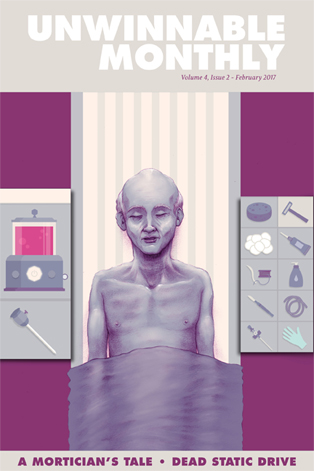
The Ground on Which our Stories are Contested
 Gavin Craig has a lot of games on his shelf that he’s never played. Backlog is his attempt to correct that.
Gavin Craig has a lot of games on his shelf that he’s never played. Backlog is his attempt to correct that.
———
This column is a reprint from Unwinnable Monthly #88. If you like what you see, grab the magazine for less than ten dollars, or subscribe and get all future magazines for half price.
———
I am not the first person to observe that it feels difficult to write about games right now. I am still deeply unsettled; I am troubled and quieted knowing there are many who have reason to feel even more unsettled. I still believe that the stories we tell and inhabit are important, and this is why I tell stories and write about games, but in this moment, it can seem that facts themselves are so endangered as to make just about everything else irrelevant.
Facts do matter, and are more than just the ground on which our stories are contested, but stories matter as well, and if there is a danger in the loss of our ability to measure our stories against each other using facts, there is as much a danger in the employment of story as an exercise in power. We do not and should not inhabit a single story. We navigate, incorporate and resist the stories around us as we create our own. Facts matter, but even in the best of cases they cannot all matter in the same way to everyone.
This is not the most powerful of conclusions. I am not as good with facts as with stories, but the fact remains that if we are to survive, we must maintain our stories as sites of resistance. There is no good that comes from the annihilation of fact in the name of story. The annihilation of fact by story, however, is followed by the annihilation of story as a tool of possibility rather than subjection.
There is value then in the story of a group bound by purpose rather than identity, fighting a mad tyrant interested in power alone, and not just power for its own sake but the power to shape reality. It is not an allegory for the current moment. It is not a blueprint for resistance. It is just a story, but a story is a place to begin.
Final Fantasy VI begins not just with a servant of empire, like Cecil in Final Fantasy IV, but a woman controlled in body and mind. When this woman, Terra, is released from the empire’s control in an encounter with an embodiment of elemental force, she finds herself lost. Ostensibly rescued by an underground resistance movement called The Returners, Terra is asked to use her power in service to the fight against the empire.
In Power-Up: How Japanese Video Games Gave the World an Extra Life, Chris Kohler reports that when Hironobu Sakaguchi planned Final Fantasy II, “it was inspired by Star Wars — a group of young people get involved with a secret rebel alliance who are rising up against an evil empire. (Sakaguchi had just seen The Empire Strikes Back and was inspired.) They fight, aided by friends, turncoats and advisors, and eventually overthrow the emperor” (94). Sakaguchi revisits this setup in Final Fantasy VI, even signaling his debt, as in many Final Fantasy games, through cameo appearances by characters named Biggs and Wedge. (Vicks and Wedge in the original Super Nintendo localization.)
Unlike Star Wars, however, when Terra is asked to fight against the empire, she faces a moment of uncertainty. Stripped of her own history, Terra can’t even be sure about whom exactly the sides are in the fight to shape her world. “How,” she asks herself, “will I know what choice is right?”
Final Fantasy VI, like Star Wars, quickly makes clear which side is good and which is evil, but I find myself dwelling in that moment. Like Terra, not because the facts of the matter are unclear — Terra has just been freed from the most intense form of coercion; I don’t think she holds any illusion as to whether the Gestahlian Empire is a force for good or evil—but because the facts are a necessary but insufficient place to start. It is one thing to know what is right and wrong, what is true and what is not, and it is something else entirely to know what is best to do next.
It is difficult to act rightly in the face of loss, and of likely future loss. It is an incredible challenge to try to change the ongoing story not for the sake of power but in the pursuit of justice. This is not the most powerful of conclusions. It is a breath, and then a beginning.
———
Gavin Craig is a writer and critic who lives outside of Washington, D.C. Follow him on Twitter @CraigGav




